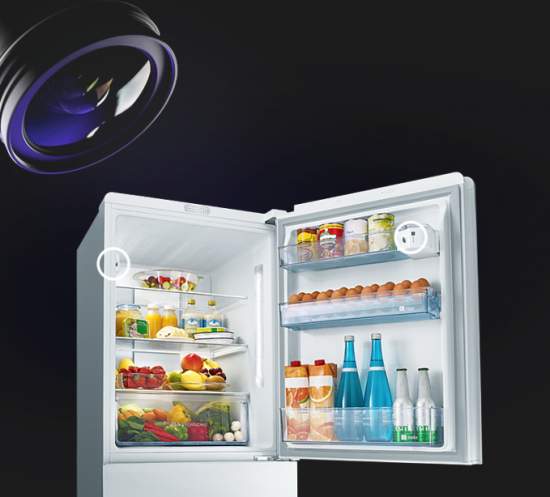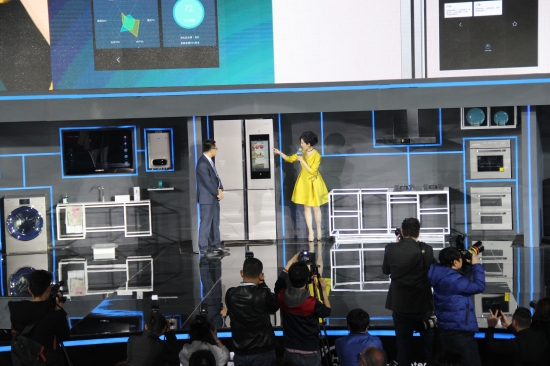OFweek smart home network news May 22nd, Jingdong teamed up with 18 refrigerator companies to launch the "Jingdong Smart Fridge Alliance" and launched Jingdong's own brand smart refrigerator, the addition of strong channels, so that the smart refrigerator is closer to the homes of ordinary people.
After years of hard work and development in the refrigerator industry and related industries, smart refrigerators have gradually emerged in the market, and now smart functions have become the standard for new refrigerator companies. With the market continuing to slump, intelligence has taken the vision of the refrigerator industry to get rid of market difficulties and open up new commercial blue oceans. However, under the premise that the industry chain is still not mature and users' habits have not yet been developed, the real outbreak of smart refrigerators is still a long way to go.
Smart storm sweeps the refrigerator industry
When the refrigerator was grafted onto the Internet, this cold hardware was given a wealth of imagination. Among all home appliance categories, refrigerators have the highest frequency of use, maintain 7*24 hours of operation, and interact with users almost every day. This gives the refrigerator industry's practitioners reason to believe that refrigerators will have great potential for smart functions.
In early 2014, Changhong introduced a CHiQ smart refrigerator that uses cloud image recognition technology and has functions such as food management, human-computer interaction, and price pushing. Domestic and foreign refrigerator companies have also successively carried out refrigerator intelligent research and business layout. The number of smart refrigerators on the market has continuously increased. Today, intelligence has become the standard for new products of various manufacturers.
At the China Household Electrical Appliances and Consumer Electronics Expo (AWE) in March this year, smart refrigerators from mainstream brands in the domestic market came to a debut. Haier, Midea, Siemens Home Appliances, Hisense, Meiling, Whirlpool and other refrigerator companies all displayed smart refrigerators. Among them, Haier and Baidu have reached a strategic cooperation, Baidu artificial intelligence voice technology is introduced on Haier Xin kitchen Internet refrigerator, and human-computer communication is achieved through voice interaction. This refrigerator also has functions such as image recognition, smell recognition, and freshness recognition. Provide users with a one-stop fresh buying service. Midea Refrigerator also cooperated with Baidu on artificial intelligence technology. Its i+3.0 smart refrigerator can be controlled by voice, capable of food management and health management, and has a screen-sensitive transparent display function.
On May 22nd, JD.com launched its first smart refrigerator developed in cooperation with Midea. This refrigerator, which uses smart image recognition technology and door-to-door technology, acquires food information through a built-in dual camera and recommends users according to the amount of ingredients in the refrigerator. Recipe matching, remind users to replenish in a timely manner, so that the refrigerator into a home food management and health service center.

Jingdong Launches First Smart Refrigerator
On May 26, the 2017 China Refrigeration Industry Summit, sponsored by the China Household Electrical Appliances Association and the Information Resource Development Department of the National Information Center, and hosted by the China National Grid, will be held in Beijing. Intelligentization will once again become a hot topic for companies at the conference. .
Smart refrigerator eco-zone seductive "money scene"
The establishment of a refrigerator-based Internet of Things application scenario will create a smart refrigerator ecosystem that integrates gourmet food, shopping, entertainment and health management. It will become a common commercial vision for refrigerator companies, especially in the continued sluggish refrigerator market and overall sales scale. With negative growth, this commercial blueprint is more attractive to refrigerator companies.
Wei Jun, general manager of Zhongkang White Appliance Business Unit, believes that the commercial value of smart refrigerators in the future may exceed the commercial value of smart TVs.
At present, Haier, Midea, Jingdong and other refrigerator companies and technology companies are all working hard to build a refrigerator-based IoT ecosystem.
During this year's AWE, Haier demonstrated the scenes of smart life in different physical spaces. Under the scene of smart kitchen life, users can listen to music, chase dramas, check recipes, and shop through the refrigerator screen. The refrigerator also connects various home appliances in the kitchen. You can send instructions to appliances such as hoods, cookers, ovens, and dishwashers. Xin Kitchen Refrigerator can obtain a large amount of food consumption, eating habits, and dietary health data of users. These data will be shared by Haier Cloud to Haier partners such as COFCO, ECO, etc. These stakeholders can personally customize the user's data through user data. The data solution was passed to the user through Xin refrigerator for the first time, thus forming a complete closed-loop ecosystem.

Haier smart kitchen life scene
In JD’s “multi-scenario, multi-terminal†smart business strategy layout, Jingdong smart refrigerator will open up a closed loop with JD’s fresh food supply chain, thus spreading JD’s e-commerce services to users, and setting up JD’s smart refrigerator alliance is also based on The same business considerations, that is, through hardware manufacturers and platform companies work together to form a "terminal + data + content + services" business model. According to Guan Yong, head of Jingdong Smart Refrigerator, Jingdong’s intelligent service platform is used to provide a comprehensive layout of the technology, service, and content layers to provide members with a complete Jingdong smart refrigerator solution, helping them quickly enter the intelligent gate.
Smart refrigerators take time to explode
Although smart refrigerators continue to have a high fever at the industrial level, smart refrigerators have yet to usher in a real explosion in the end market. According to China Yikang estimation data, the retail sales volume of smart refrigerators in China's market is expected to reach RMB 8.5 billion in 2016, a year-on-year growth rate of 132.1%, but accounting for only 10.2% of the total retail sales of the refrigerators. In the four categories of large appliances, smart refrigerators accounted for the lowest proportion in the overall market.
According to the monitoring data from Ove Cloud Network, from January to April 2017, the retail penetration rate of refrigerators was 14.8%, which was significantly lower than that of other household appliances.
Wei Dongmin, an analyst at Ovid Cloud Appliances Big Data Group, believes that since the development of smart refrigerators, the industry has developed rapidly but the market has been slow. The industrial chain involved in establishing the economic circle of the kitchen economy is too long and the cost is too high. Therefore, it takes time to build a mature smart refrigerator ecosystem and promote smart refrigerators.
Zuo Yanxi, general manager of Zhongkang Brand Center, said that despite the heavy expectations of smart refrigerators, only a breakthrough has been made in the sales promotion node. WiFi configuration has basically become an option for enterprises to occupy functional spaces, and large-screen products are insufficient for demand mining and landing. In place, on the one hand, consumers' acceptance of smart products has yet to be improved. On the one hand, the establishment of the entire smart home ecosystem is still on the surface. The development of smart refrigerators also needs new opportunities.